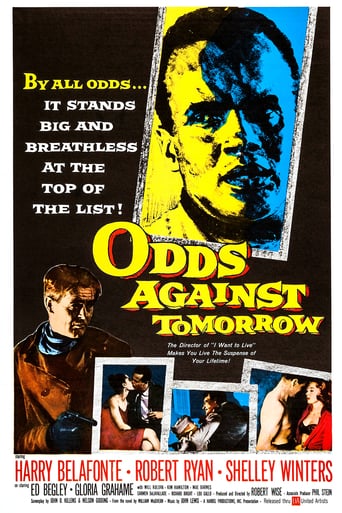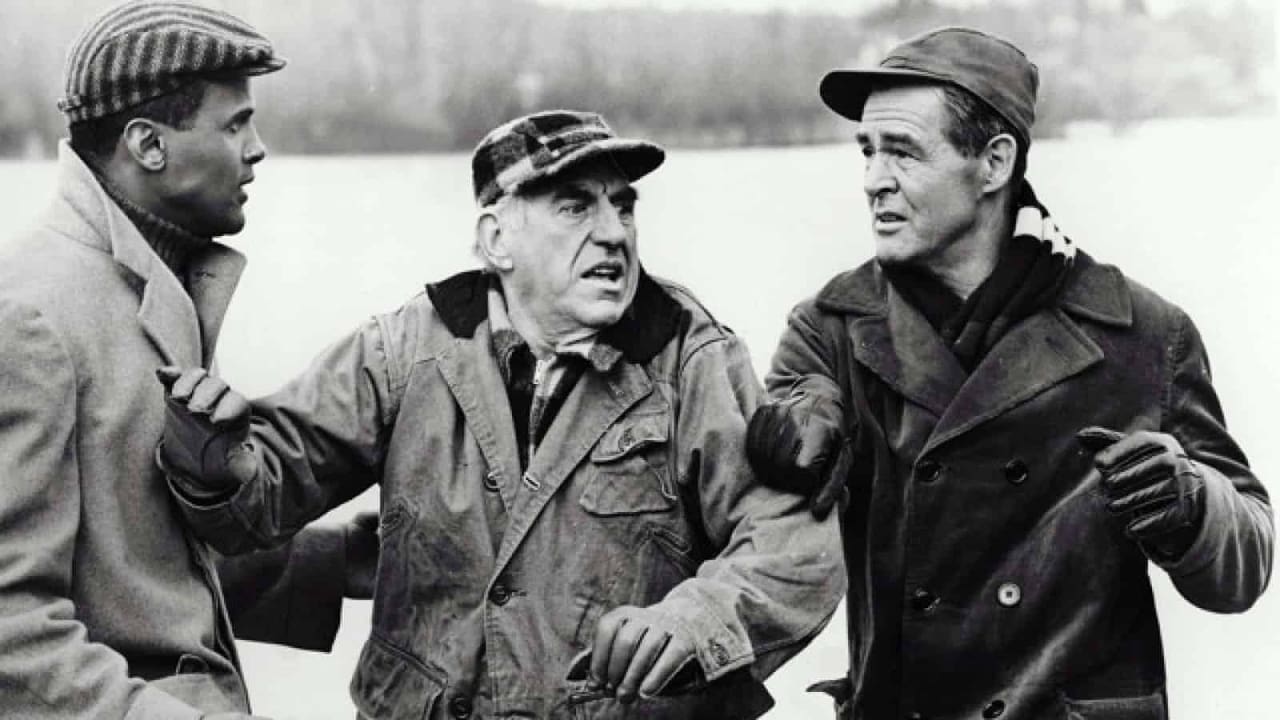disinterested_spectator
After World War II, Hollywood began making movies portraying those who were not Caucasian in a more positive light, showing them to be not only morally and mentally equal to white people, but in many cases more virtuous or intelligent than whites as well. Some of these movies were quite good, while others were of inferior quality. Of all these movies, "Odds Against Tomorrow" was the most ham-handed, presenting a case against racism so simplistic that it is only suitable for Sunday School, provided the children in that Sunday School class have not yet reached the sixth grade.There are two main characters: Johnny Ingram, who is black, and Earle Slater, who is white. Over and over, throughout this movie, we are shown how Johnny is good and Earle is bad. Therefore, white people are not superior to black people. Therefore, racism is wrong.Using Robert Ryan to play Earle gives the movie a head start in making its point, inasmuch as Ryan had often played unlikable characters, and had played a bigot in both "Crossfire" (1947) and "Bad Day at Black Rock" (1955). In the opening scene, a group of children are playing, and a little black girl accidentally runs into Earle. He picks her up and calls her a pickaninny. He continues to use derogatory racist terms disparaging African-Americans during the rest of the movie. Then he goes into a hotel. He is rude to the clerk, who is white, and is even ruder to the elevator operator, who is black, refusing to respond to his attempts at casual conversation. When he gets to the room he is going to, ex-cop Dave Burke offers Earle a chance to be part of a bank robbery. During the conversation, we find out that Earle has an explosive temper, which goes with the fact that he has served two stretches in prison, one for assault with a deadly weapon and one for manslaughter, which he later says he enjoyed.After he leaves, Johnny arrives. Johnny is played by Harry Belafonte. His light skin and Caucasian features were probably supposed to make it easy for the white audience to set aside any prejudices they might have. Johnny is really nice to those same children Earle saw earlier, and he is nice to the elevator operator, and he is nice to Dave Burke. Gosh, he's nice. During their easy-going, polite conversation, it turns out that Johnny is basically law-abiding, but he plays the horses and is in debt to a loan shark. And he is reluctant to take the job robbing the bank, but eventually agrees to because he needs the money. Earle is reluctant to take the job too, mainly because he finds out he would be working with a black man.Johnny is a divorced man who supports his wife with alimony. He is still in love with her. Earle is supported by Lorry, a woman he is shacked up with. He cheats on her.Johnny is a wonderful father to his daughter, and is happy to babysit her when his wife needs him to. When Lorry asks Earle to babysit the neighbor's child, he becomes angry and rude, and he refuses to do it.In addition to Johnny's being a better person than Earle regarding their moral qualities, Johnny is also smarter, of course. When there is a snag in the plan to rob the bank, Johnny is the one who figures out a solution.Just before the holdup, the three men separately kill time, waiting for nightfall. Johnny is sitting by a river when suddenly he sees what appears to be a white baby floating in the water. He is alarmed and runs over to get a closer look. It is just a doll. Johnny is relieved.While Earle is sitting in his car, he sees a cute little bunny rabbit. He smiles as he gets out his shotgun. When the rabbit tries to run away, Earle shoots it.The only thing that makes this Sunday School lesson tolerable is that it is built around a bank heist, which eventually takes place, but it all goes bad. When Dave gets shot several times by the police, Johnny is unhappy, and he tries to save Dave. When Dave shoots himself in the head, Earle is happy, because now Dave won't be able to talk.In the end, Earle and Johnny end up killing each other, blowing up a bunch of tanks with flammable liquid in the process, leaving only their charred bodies behind. The police are unable to tell which one is which. You see, all men are basically equal, especially when they are dead.
dartleyk
brilliant shooting by wise, great low-key winters, truly searing robert ryan who carries the movie, intense offbeat begley, unfortunately bogged down by belafonte- pop singer who is a stick on screen; of course the main point is race relations, and that's the part you wind up feeling as a preachy intrusion that almost cripples a stunning film noir crime drama heist rivaling some of the best like rififi; didn't need the help but john lewis score also tops , though also didn't need the minor showcase of belafonte doing his bit in a nightclub, but his company put up the money so he got some cameos; if you have the time to read up, wise shot standard aspect ratio, used infra-red film in some scenes; interesting that variety had it right, and tactfully, after the opening: " "On one level, Odds against Tomorrow is a taut crime melodrama. On another, it is an allegory about racism, greed and man's propensity for self-destruction. Not altogether successful in the second category, it still succeeds on its first." yup
Zbigniew_Krycsiwiki
I love the hallucinatory opening credits to this noir/ heist flick, seeing it in a cinema on a big screen.Three men (one of them with several thousand dollars in gambling debt) conspire to steal $200.000 from a small town bank in upstate NY.Robert Ryan is alternately racist and cowardly, watch how quickly he runs away when he gets his feelings hurt. Belafonte is sympathetic in some scenes, appropriately unlikeable in others. The two characters are, understandably, at each other's throats throughout. Ed Begley's ringleader character is mostly just a goofball, albeit one with a memorable death scene. Great jazz score and an abrupt, explosive (literally, and also rather funny) ending caps things off well, after slow pacing in film's second act. Gotta love the bizarre lift, also, and its even more bizarre liftman.
kenjha
A retired cop recruits a racist ex-con and a black musician with gambling debts to rob a bank. This is a bleak drama marked by depressing settings and gray skies. Wise creates a gritty atmosphere but is let down by a script that starts off well but runs out of steam, reaching an unsatisfying conclusion. The screenplay is by Polonsky, who is more famous for being blacklisted than for anything he actually wrote or directed. It is well acted. Belanfonte reached his cinematic peak in 1959, starring in and producing two films. Ryan shows he can play a bigot as well as anybody. Begley is fine as the ex-cop. The jazzy score is apt if overused.



 AD
AD





